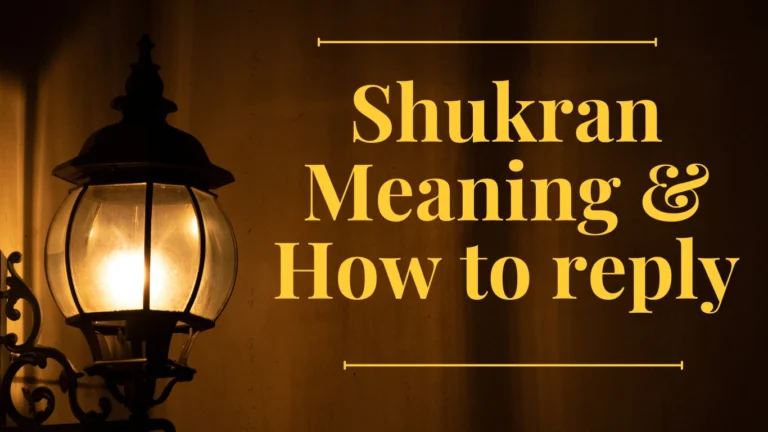In the world of diverse languages and cultures, certain words carry profound meanings that often transcend mere translations. One such word is “Shukran,” a term deeply embedded in Arabic culture and language. For those interested in understanding this fascinating word, this blog post aims to unravel the various layers of “Shukran,” its significance, usage, and translations in different languages.
Shukran Meaning
Imagine a world where a single word could bridge gaps between languages, cultures, and religions. “Shukran” is such a lovely way to express gratitude and appreciation, doing it simply yet in a way that really makes an impact!. It captures the essence of thankfulness, reminding us of the power of kind words in our daily lives.This post dives deep into the meaning of “Shukran” in Arabic, its translations in other languages, its significance in Islam, and much more. If you’re curious about how this word functions in various contexts, read on to discover its full spectrum.
Shukran Meaning in Urdu
In Urdu, a language spoken by millions in Pakistan and India, “Shukran” is directly translated from Arabic. Although Urdu incorporates many Arabic words due to historical influences, “Shukran” serves the same purpose expressing thanks and gratitude. People use it interchangeably with the Urdu word “Shukriya,” making it a common expression in everyday conversations.
Shukran Meaning in English
The translation of “Shukran” in English is “thank you.” While the English term is straightforward, “Shukran” carries cultural and emotional nuances that make it particularly special. It’s not just an expression of gratitude; it’s a way to convey deep appreciation and respect.
Shukran in Arabic
Written in Arabic script, “Shukran” looks like this: شكراً. It’s often used in both formal and informal settings, making it a versatile word in the Arabic language. Whether you’re thanking someone for a small favour or expressing gratitude for a significant act, “Shukran” fits almost any occasion.
Shukran Meaning in Islam
In Islam, expressing gratitude goes beyond mere social niceties; it’s a profound religious duty. While “Shukran” is a common expression of gratitude among Muslims; however, a more profound phrase is “Jazakallah Khair,” which translates to “May Allah reward you [with] goodness.” This beautiful expression functions as a sincere prayer, serving as a reminder that every act of kindness is ultimately rewarded by Allah.Embracing gratitude enriches our lives and strengthens our connections with one another!
Shukran Meaning in the Quran
While the word “Shukran” may not appear directly in the Quran, the beautiful concept of gratitude is woven throughout its teachings, inviting us to reflect on the importance of thankfulness in our lives. Verses encourage believers to thank Allah for His blessings, making gratitude a fundamental aspect of Islamic belief. The word “Shukran” serves as a practical tool for Muslims to live out this principle in their daily lives.
Shukran Meaning in Hindi
In Hindi, another language rich with cultural and historical depth, “Shukran” is not as commonly used. However, due to the close relationship between Urdu and Hindi, Hindi speakers familiar with Urdu might understand “Shukran” as a term of gratitude. The Hindi equivalent would be “Dhanyavaad,” but using “Shukran” adds an extra layer of cultural appreciation.
Shukran Reply
When someone says “Shukran,” the appropriate response is “Afwan,” which means “you’re welcome” or “not at all,” depending on the context. This exchange completes the cycle of gratitude and acknowledgment, reinforcing social bonds and mutual respect.
Shukran Habibi Meaning
Adding “Habibi” (which means “my dear” or “my beloved”) to “Shukran” personalises the expression even more. “Shukran Habibi” translates to “Thank you, my dear,” making it a heartfelt way to show appreciation. It’s commonly used among close friends and loved ones.
Variations of Shukran in Arabic
The word “Shukran” has several variations, each adding a different shade to its meaning:
- Shukran Ya Lak (شكرا يا لك) means “Thanks a lot.”
- Shukran Jazilan (شكرا جزيلا) means “Thank you so much.”
- Shukran Jazilaan Lak (شكرا جزيلا لك) means “Thank you very much.”
These variations allow speakers to express varying degrees of gratitude, making “Shukran” a flexible and rich word.
Shukran Used in a Sentence
Often, the best way to understand a word is through examples.Here are a few ways people use “Shukran” in everyday chats:
- Example 1: Shukran for helping me move in.
- Example 2: Thanks for all the kind wishes and prayers! Love y’all.
- Example 3: Shukran Ya Allah For Another Blessed Friday.
- Example 4: Thanks to Almighty Allah that He Blessed me with a son… Shukran.
- Example 5: Passed a course I thought I’d fail & I passed it well, Shukran Allah.
Conclusion
“Shukran” is more than just a word; it’s a cultural bridge that links people across different languages and religions. Understanding its various meanings and uses enriches our appreciation for Arabic and Islamic culture. Whether you’re a language enthusiast, a student of religion, or someone looking to expand your vocabulary, the word “Shukran” offers a window into a world of gratitude and appreciation.

